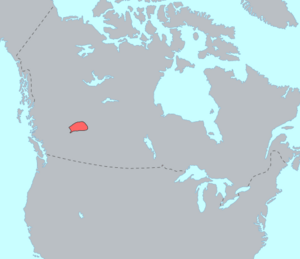Stoney language facts for kids
Quick facts for kids Stoney |
|
|---|---|
| Nakoda, Nakota, Isga | |
| Native to | Canada |
| Ethnicity | Nakota: Stoney |
| Native speakers | 3,025 (2016) |
| Language family |
Siouan
|

The location of Stoney / Nakoda
|
|

|
|
The Stoney language is also known as Nakota, Nakoda, or Isga. It is a language spoken by the Stoney people in Canada. This language is part of a larger group called the Siouan language family.
Stoney is closely related to other languages like Dakota, Lakota, and Assiniboine. These languages are like different versions of the same language family. Stoney is the most different among them. Some people even say it is almost its own separate language.
The Stoney people are the only Siouan group who live completely in Canada. The Stoney language is spoken by five different groups in Alberta, Canada. We do not have an exact count of how many people speak Stoney. However, it is likely spoken by a few thousand people. Most of them live in the Morley community.
Contents
How Stoney is Related to Assiniboine
The language most similar to Stoney is Assiniboine. People often mix them up because they have a close history. They also share many language features.
However, Stoney and Assiniboine are not exactly the same. Speakers of one language cannot easily understand the other. Stoney either grew out of Assiniboine, or both languages came from an older, shared language.
How Stoney Sounds
Scientists have not studied the Stoney language as much as other languages. But we do know that different types of Stoney sound quite similar. Still, there are some important differences.
For example, the Stoney spoken in Morley has certain sounds. These sounds are made using different parts of your mouth. They include sounds like 'p', 't', 'k', 's', 'm', and 'w'.
Another type of Stoney is spoken at the Alexis Nakota Sioux Nation. This version has some unique sounds. It has three different ways to say certain sounds. These are called plain, aspirated (with a puff of air), and ejective (with a popping sound).
Alexis Stoney also has long and short vowel sounds. It also has nasal vowel sounds. These are sounds where air comes out of your nose, like in some French words. These features are not found in all other related languages.
Stoney Writing System
The Stoney language has its own alphabet. This alphabet helps people write down the sounds of the language. Here are the letters used in the Stoney alphabet by the Alexis Nakota Sioux First Nation:
| a | â | aa | b | c | c' | d | e | ê | ee | g | h | i | î | ii | j | k | k' | m | n | o | ô | oo | p | p' | r | s | sh | t | t' | u | û | uu | w | x | y | z | zh | ? |
Common Stoney Words
Learning a few words can be fun! Here are some common words in the Stoney language:
- One — Wazhi
- Two — Nûm
- Three — Yamnî
- Four — Ktusa
- Five — Zaptâ
- Man — Wîca
- Woman — Wîyâ
- Sun — Wa
- Moon — Hâwi
- Water — Mini
 | James B. Knighten |
 | Azellia White |
 | Willa Brown |

